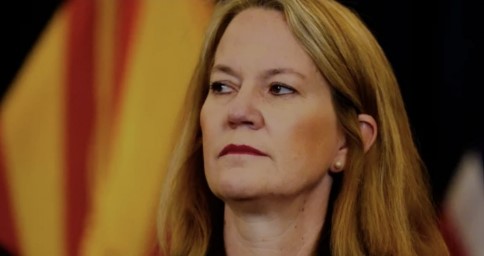
by Matthew Holloway | Sep 14, 2025 | Education, News
By Matthew Holloway |
A dozen Maricopa County libraries have removed more than 50 books on sex education and puberty from their children’s sections. The move follows complaints from parents and advocacy groups who said the books contained inappropriate material.
As previously reported by AZ Free News, the Maricopa County Library District (MCLD) has been subject to increasing criticism from parents’ rights advocates like Arizona Women of Action (AZWOA) and EZAZ, who engaged with the Maricopa County Board of Supervisors (BOS) in June. The groups objected to books such as “It’s Perfectly Normal” by Robie H. Harris and “This Book Is Gay” by Juno Dawson for the titles’ graphic depictions of sex and sexual behavior.
Responding to a petition launched by AZWOA, the BOS approved a pilot program at the Queen Creek Library, allowing parents to submit a form listing books their children may not check out.
According to AZCentral, the Board later directed the books to be relocated in response to the concerns brought to them. Due to the administrative nature of the move, a formal vote was not required. Supervisor Steve Gallardo, the board’s only Democrat, expressed objections to the outlet, saying, “Call it whatever you want … it’s wrong, and we shouldn’t be engaging in this.” Gallardo claimed that although he “agreed with some of the changes,” parents should be responsible for monitoring their children in the libraries.
Republican Supervisors Lesko, Stewart, and Brophy McGee supported the measure fully, stating that the measure is intended to:
- “Protect our youngest from their prying eyes and curiosity,” per Stewart.
- “Relocate questionable books into areas of the library that are less, or not, accessible to children,” according to Brophy-McGee.
- “Make sure that sexually explicit library books are out of the reach of minors,” as described by Lesko.
As reported by the Arizona Daily Independent, several books were brought to the BOS’s attention, though the complete list of inappropriate books is extensive. The AZWOA referred to a book rating site, ratedbooks.org, as well as a book list on Scottsdaleunites.com.
Merissa Hamilton of EZAZ later posted a list of egregious books found on MCLD shelves. Highlighted titles include “It’s Perfectly Normal: Changing Bodies, Growing Up, Sex, and Sexual Health” by Robie H. Harris, which features cartoon-like drawings with sexually graphic information. “This Book Is Gay” by Juno Dawson is also in question because it instructs children on how to engage in meetups for casual sexual encounters. Novels by Ellen Hopkins graphically depict sex, human trafficking, and abuse. These books may violate state statutes, including ARS 13-3506:
“It is unlawful for any person, with knowledge of the character of the item involved, to recklessly furnish, present, provide, make available, give, lend, show, advertise, or distribute to minors any item that is harmful to minors. C. A violation of this section is a Class 4 felony.”
These library books may also violate ARS 13-3507:
“A. It is unlawful for any person knowingly to place explicit sexual material upon public display or knowingly to fail to take prompt action to remove such a display from property in his possession or under his control after learning of its existence. B. A person who violates any provision of this section is a Class 6 felony.
The potential prompted citizens to consider bringing these books to the attention of the county’s sheriff and attorney’s offices.
County Manager Jen Pokorski told Republic reporters in June that the county is contemplating a new rule, a new “software solution” which would permit parents to restrict their children’s access to different books by category.
“I think the goal of the new software would be, the books that we’ve deemed — or that have illustrative pornography, will be off limits to children under a certain age,” Supervisor Mark Stewart explained. “And then anything that a parent would want to opt their child into, they’re welcome to sign up and do that.”
However, he did clarify, to the Arizona Republic, “I did not say that sex-ed books are illustrative pornography.”
Matthew Holloway is a senior reporter for AZ Free News. Follow him on X for his latest stories, or email tips to Matthew@azfreenews.com.

by Matthew Holloway | Sep 8, 2025 | Education, News
By Matthew Holloway |
With the tragic murder of a Maryvale High School student and the brutal attack against the Annunciation Catholic School in Minneapolis, MN, still fresh in public memory, State Superintendent of Public Instruction Tom Horne submitted a legislative budget request for $180 million to continue and expand state funding to put more armed officers on campuses throughout Arizona.
Existing funding for school safety, by initial appropriation and carryover, totals $128 million. Federal funding also provides an additional $20 million. According to the Arizona Department of Education, both are scheduled to expire in 2026. To address this, Horne has reportedly submitted the request for $180 million, which, if approved, “would ensure the current level of funding will continue and the added $32 million will allow for expanding the program for more officers and training.”
In a statement released Thursday, Horne said, “Over the past several weeks, our nation has witnessed terrible school tragedies. This problem is not going away, and we need to address it aggressively. Therefore, I am now making a budget request of the legislature to appropriate at least $180 million to make sure we have no gap in providing funding for armed officers on campuses. This request adds dollars to hire and train officers for more schools statewide to protect students, educators, and classified staff.”
Horne referred back to the successful intervention of a heroic Tucson Police Officer William Bonanno, who thwarted an attempted attack on Legacy Traditional School-East Tucson in January.
“The value of having armed officers on campuses is beyond dispute. One of the best examples occurred earlier this year when a heroic Tucson police officer arrested an armed intruder on a school campus during class hours.
“This criminal was armed with a gun and a knife and told the officer he was there to kill children and make them famous. The officer was on that campus because of funding through the department’s School Safety Program. In fact, he had been hired less than a month earlier using supplemental dollars my department made available. This program works and deserves more funding so it can be expanded. Every parent should want an officer on their child’s campus.”
Maricopa County Schools Superintendent Shelli Boggs issued a concurring statement saying, “I will continue to advocate for school safety programs. This is about ensuring that every student, in every school, in every neighborhood, has the peace of mind that comes from knowing they are safe.”
Maricopa County Sheriff Jerry Sheridan offered his support as well, stating, “As Sheriff of Maricopa County, I strongly support Superintendent Horne’s efforts to fully fund our school safety program to ensure all schools have these resources to protect our kids. There is no greater responsibility for society than to do everything possible to keep children safe, especially in a place of learning and growing. To that end, we currently have dozens of MCSO deputies participating in this program, and additional funding will allow us to expand our services.”
Matthew Holloway is a senior reporter for AZ Free News. Follow him on X for his latest stories, or email tips to Matthew@azfreenews.com.

by Matthew Holloway | Sep 5, 2025 | Education, News
By Matthew Holloway |
Grand Canyon University announced projections for record-breaking student enrollment for the 2025-26 academic year with as many as 133,000 Antelopes or ‘Lopes’ as they’re called, donning the Christian university’s signature purple and black. The new year enrollment represents an increase of approximately 8% over the fall 2024-25 enrollment figure. The increase isn’t limited to online students either, with the university seeing a ten percent increase in new students attending in-person instruction at the North Phoenix campus.
Specifically, the total projected enrollment of GCU for 2025 is 133,000 or more. On-campus enrollment is projected to be approximately 25,000, while online enrollment is expected to exceed 118,000.
In a press release, GCU President Brian Mueller attributed the uptick to the university’s “three core strengths,” citing “high-quality academics, taught from a Christian worldview perspective, a longstanding commitment to affordability, and a vibrant Christ-centered campus culture.”
“There is no shortage of families looking for high-quality, affordable education options rooted in Christian values,” Mueller said. “And they come from every corner of the country.”
In a press release, the GCU emphasized its policy of a tuition freeze for in-person students for the past 17 years, with “only nominal increases in online tuition.”
Mueller also explained, “If I ask students on our ground campus why they chose GCU, 9 out of 10 will say it is because of the community atmosphere on campus It’s what we’re known for, and faith plays a big part in creating that culture.”
Fresh off setting a record in April 2025 for its largest graduating class to date, GCU issued the release corresponding with the university’s ‘Welcome Week,’ describing the festivities as “a spirited tradition that includes more than 105 events organized by Welcome Programs staff alongside more than 500 Welcome Crew and Student Affairs volunteers. Activities range from student orientations, daily socials and nightly events such as Canyon Cooldown, Silent Disco and the inspirational Ignite worship ceremony, which sets the tone spiritually for the school year.”
Matthew Holloway is a senior reporter for AZ Free News. Follow him on X for his latest stories, or email tips to Matthew@azfreenews.com.

by Ethan Faverino | Sep 4, 2025 | Education, News
By Ethan Faverino |
The Phoenix Union High School District (PXU) is set to vote on a proposed Memorandum of Understanding (MOU) with Chicanos Por La Causa (CPLC), an Arizona-based nonprofit, at its upcoming school board meeting.
The agreement, effective from July 1, 2025, to June 30, 2027, aims to provide substance abuse prevention and mental health services to students at Carl Hayden High School, Bostrom High School, and Maryvale High School.
However, the proposal sparked debate among board members and community advocates, with concerns about the scope of services and their alignment with student needs.
The MOU outlines CPLC’s role as a subgrantee of the Arizona Health Care Cost Containment System (AHCCCS) under the federal Substance Abuse Prevention and Treatment Block Grant (SABG). The SABG targets groups such as pregnant women, drug users, and individuals with HIV/AIDS, alongside primary prevention services for substance abuse.
Under the proposed agreement, CPLC would deliver primary substance abuse prevention services and counseling to referred PXU students, with a specific mention of “Health Masculinity Services for Self-Identified Males.”
The proposed MOU has drawn criticism from some PXU board members, notably Jeremiah Cota, who announced via X his intent to vote against the contract.
Cota expressed concerns that the agreement prioritizes services for self-identified males and potentially includes abortion-related support under the guise of “wrap-around” services, labeling CPLC a “leftist activist group.”
His stance has been amplified by Arizona State Representative Teresa Martinez, who praised Cota’s advocacy while criticizing PXU for ignoring student safety, particularly in light of recent discussions about reinstating school resource officers (SROs).
The SROs were removed from PXU campuses in 2020 following concerns about police interactions with minority students.
Despite recommendations from the district’s student safety committee in March 2023 to reinstate SROs, the board postponed the decision, opting for further study sessions and maintaining an off-duty officer model.
No SRO vote is scheduled for the upcoming meeting, intensifying the frustration among advocates, who argue student safety is being pushed aside.
Ethan Faverino is a reporter for AZ Free News. You can send him news tips using this link.

by Matthew Holloway | Sep 2, 2025 | Education, News
By Matthew Holloway |
Responding to a letter issued by Arizona Democrat Attorney General Kris Mayes, Arizona Superintendent of Public Instruction Tom Horne issued a statement that Mayes is “misleading the public with claims she has leveled at the management of the Empowerment Scholarship Account (ESA) program.” In an 8-page letter with 12 pages of testimony from the Arizona Department of Education’s John Ward in the case of Velia Aguirre v. State of Arizona, Mayes outlined an investigation from her office, making allegations regarding the Department of Education’s use of a risk-based audit approach, which echoes a similar exchange between Horne and Governor Katie Hobbs in December 2024.
Mayes directly critiqued Horne and the ADE writing in part:
“Your failure to appropriately monitor ESA spending has created an untenable situation. Again, I do not want to disrupt the process for ESA holders who are following the law, but this cannot continue. Accordingly, you must act immediately to develop and implement appropriately rigorous purchase review standards and risk-based audit procedures so that ESA families may access their funds in a timely manner and public funds are not spent illegally. The Department’s purchase review and audit standards should employ appropriate controls to safeguard public funds. These controls, and any automatic payment thresholds, should consider the level of risk associated with different categories of expenses, vendors, methods of payment, and individual ESA holders.”
Mayes went on to cite a 12 News report that “the Department has automatically approved [$]1.2 million ESA purchases since the automatic approval policy took effect in December 2024.”
As Matt Beienburg wrote in an op-ed for AZ Free News, the Arizona Capitol Times issued a retraction of its initial report that “Education department under fire for approving $124M in improper ESA [education savings account] purchases,” clarifying with a formal correction that “an inaccurate dollar amount,” was reported. However, no similar retraction has been issued by 12 News as of this report.
Beienburg notes that blatantly inappropriate purchases such as iPhones, televisions, and other non-educational items “haven’t been approved, as the State Board of Education’s ESA Handbook—ratified by members appointed by both former Gov. Doug Ducey and Gov. Katie Hobbs—makes clear. The document expressly states that while families’ ESA purchases under $2,000 are promptly reimbursed by the state, these items ‘are not deemed ‘approved’ by the Department, until they are audited OR the timeframe to audit the orders has passed [2 fiscal years].’ Just like their tax returns filed with the IRS, these families’ ESA purchases are processed up front and subject to enforcement afterwards.”
In a lengthy statement, Horne addressed the allegations raised by Mayes and accused the AG of making false statements:
“In your letter today, and in a recent television interview, you misled the public by stating that improper ESA purchases had been approved, without any reference to the fact that under risk-based auditing dictated by the legislature the money has been recovered or is in the process of being recovered. We have collected or are in the process of collecting more than $600,000 that was paid out for improper purchases.
You also criticize risk-based auditing. Risk-based auditing is a very common and appropriate practice used by auditors, and the ESA Director has more than 16 years’ experience as an auditor. The risk-based approach involves not approving purchases prior to review, but paying amounts under $2,000 subject to later review, which is how we were able to collect or be in the process of collecting more than $600,000.”
He went on to chide Mayes writing, “You state that this is not partisan. That is disproved by all the false statements you made on the television interview.”
Horne continued, “Your argument is not with me but with the legislature. The legislature recently passed ARS section 15–2403B. It provides in part: ‘The department, in consultation with the office of the auditor general, shall develop risk-based auditing procedures for audits conducted pursuing to this subsection.’
“The statute was passed because the department is operating with the same number of people to check purchases as had been given by the legislature when the program was 1/7th as large. The most recent House budget included an appropriation for more people to check purchases, but it had to drop that provision when the governor said that if it did not do so, she would veto the entire budget. The limit on personnel had meant delays for reimbursement or more than two months, which was an unbearable burden for parents who had already paid the money and needed reimbursement. This explains why the legislature wanted to add more staff to serve parents.
“Again, you misled the public in your interview by stating that these improper items have been approved. They were not approved, and as to all the items you mentioned, the accounts have already been frozen. This is as egregious as ignoring the recovery of over $600,000, not to mention your failure to state that this procedure was dictated to us by the legislature and the ESA parent committee that you referred to set the limit at $2,000 pursuant to the legislative command to adopt risk-based auditing. It has been made clear to ESA users in multiple communications that payments of under $2,000 do not imply approval, which can be obtained only after the risk-based auditing dictated by the legislature.
“You referred to a July 21 meeting of the legislative audit committee. Within four days we consulted with the auditor general. Some have erroneously interpreted the word ‘consultation’ to mean that the auditor general has the right to dictate terms to us. That is incorrect. The normal English language use of the word consultation is that we have a discussion, which we have done, and then proceed. However, we have agreed to have further consultations with the auditor general and will do so.
“We will provide at a later date further responses to your long-winded letter of seven pages single space. We are responding now to the main points so you will have no further excuse to mislead the public.”
Matthew Holloway is a senior reporter for AZ Free News. Follow him on X for his latest stories, or email tips to Matthew@azfreenews.com.

by Ethan Faverino | Sep 1, 2025 | Education, News
By Ethan Faverino |
The Scottsdale Unified School District (SUSD) is under criticism from parents and community members over a BrainPOP lesson taught to elementary students that compares the struggles of the Tuskegee Airmen, the first African American military aviators, to those of LGBTQ+ service members.
The lesson, part of BrainPOP’s supplemental curriculum, has sparked significant backlash due to its inclusion of a call to action and a cartoon depiction of a newspaper headline reading “LGBT Welcome in the Military,” showing protestors with a rainbow banner outside the White House.
In the video, it states, “Thanks to pioneers like the Red Tails, the armed services integrated shortly after the war. It was an early victory for the budding Civil Rights movement. In the decades to come, the federal government would expand its role in protecting the rights of African Americans and the rights of other marginalized groups. Injustice never ends overnight. It takes brave people to challenge it and show everyone else that there’s another way.”
People in the community have raised an alarm about SUSD’s approval of hundreds of supplemental resources, like BrainPOP, without any committee review or community input.
The online nature of these platforms allows publishers to update content at any time, limiting transparency. For example, in a course given to 2nd graders, a search for “gender” on BrainPOP yields topics such as Pride Month, personal pronouns, sex determination, women’s suffrage, and feminism, which push ideological agendas over academic focus.
BrainPOP, hosting over 1,000 animated films for K-8 students, has been controversial since introducing LGBTQ+ content in 2017 following the Pulse nightclub shooting.
Additional concerns stem from lessons like “Black Lives Matter Protests,” which discuss racism and cite the deaths of George Floyd, Trayvon Martin, and Michael Brown, ignoring essential facts, such as the reality that each of the men acted as the main aggressor in the events leading to their deaths. The character in this lesson speaks on the Black Lives Matter Movement, saying, “The protests we’re seeing today aren’t really about that sort of thing. They are about structural racism in our society. A built-in system of bias that makes life easier for white people and more difficult for black people and other people of color. It puts them at greater risk for poverty, unemployment, and disease.”
The growing dissatisfaction with these lessons taught to K-8 students has led to the creation of the Empower Hotline, a platform for reporting lessons that deviate from academic standards by focusing on race, ethnicity, gender ideology, social-emotional learning, or inappropriate sexual content.
The hotline’s goal is to empower parents to ensure education prioritizes individual merit and academic rigor.
Arizona law prohibits sex education before fifth grade, and the 2025 Supreme Court ruling in Mahmoud v. Taylor mandates parental notifications for materials addressing gender identity or sexual orientation.
Ethan Faverino is a reporter for AZ Free News. You can send him news tips using this link.






